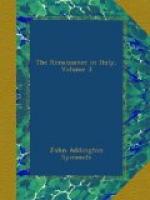If each the other love, himself
foregoing,
With such delight,
such savour, and so well,
That both to one
sole end their wills combine;
If thousands of these thoughts
all thought outgoing
Fail the least
part of their firm love to tell;
Say, can mere
angry spite this knot untwine?
COLUI CHE FECE
He who ordained, when first
the world began,
Time that was
not before creation’s hour,
Divided it, and
gave the sun’s high power
To rule the one, the moon
the other span:
Thence fate and changeful
chance and fortune’s ban
Did in one moment
down on mortals shower:
To me they portioned
darkness for a dower;
Dark hath my lot been since
I was a man.
Myself am ever mine own counterfeit;
And as deep night
grows still more dim and dun,
So still of more
mis-doing must I rue:
Meanwhile this solace to my
soul is sweet,
That my black
night doth make more clear the sun
Which at your
birth was given to wait on you.
A sonnet written for Luigi del Riccio, on the death of his friend Cecchino Bracci, is curious on account of its conceit.[432] Michael Angelo says: “Cecchino, whom you loved, is dead; and if I am to make his portrait, I can only do so by drawing you, in whom he still lives.” Here, again, we trace the Platonic conception of love as nothing if not spiritual, and of beauty as a form that finds its immortality within the lover’s soul. This Cecchino was a boy who died at the age of seventeen. Michael Angelo wrote his epicedion in several centuries of verses, distributed among his friends in the form of what he terms polizzini, as though they were trifles.
A PENA PRIMA
Scarce had I seen for the
first time his eyes
Which to thy living
eyes are life and light,
When closed at
last in death’s injurious night
He opened them on God in Paradise.
I know it and I weep, too
late made wise:
Yet was the fault
not mine; for death’s fell spite
Robbed my desire
of that supreme delight,
Which in thy better memory
never dies.
Therefore, Luigi, if the task
be mine
To make unique
Cecchino smile in stone
For ever, now
that earth hath made him dim,
If the beloved within the
lover shine,
Since art without
him cannot work alone,
Thee must I carve
to tell the world of him.
In contrast with the philosophical obscurity of many of the sonnets hitherto quoted, I place the following address to Night—one, certainly, of Michael Angelo’s most beautiful and characteristic compositions, as it is also the most transparent in style[433]:—




